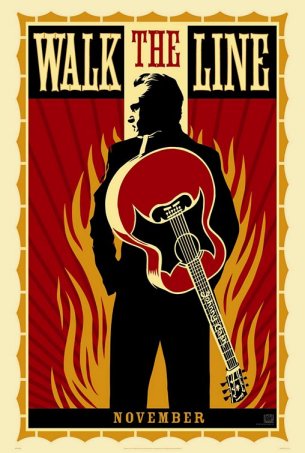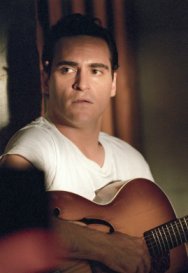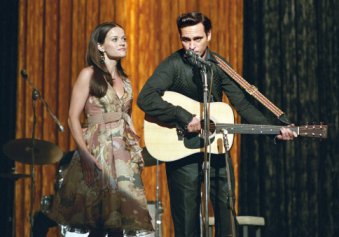|
Walk
the Line Director
James Mangold’s Johnny Cash biopic, Walk the Line,
has a bevy of things going against it. For one, Joaquin
Phoenix and Reese Witherspoon are either “give or
take” performers depending on the project in question.
Another issue is Mangold himself, who has failed to deliver
anything of real substance or merit to date.
However
the biggest obstacle facing all parties involved is, perhaps,
the Man in Black himself, Johnny Cash. Regardless of having
Cash’s biographies to pool from, how does a film capture
a mythical figure like Cash without falling into the conventional
trappings of typical celebrity biopics?
It would seem
nearly impossible to succeed considering these odds, yet
somehow Mangold and company rise to the occasion, producing
a film that not only embodies Johnny Cash, but bleeds Cash
from its very pores. We meet Johnny Cash (Phoenix) amidst
his pinnacle live recording “Johnny Cash at Folsom
Prison.” His band rambles along, their beat churning
along like a locomotive as Cash stands backstage lost in
thought. A voice calls out to him, but he is lost in thought
with a finger prodding a table saw blade.
This
is the door opening up into Cash’s life for viewers
to peer through, and although flashbacks are usually considered
to be weak storytelling devices, somehow the convention
suits the story being told. One of the primary reasons this
works so well is that most of Cash’s life was filled
with torment, regret, and pain stemming from sins predicated
upon events in his past. His music was filled with reflection,
telling a story that unfolded raw emotion in an open and
honest fashion, so it almost necessary to engage Cash at
a moment of contemplative introspection.
Born J.R. Cash,
Johnny’s struggle with remorse began at age twelve,
when his brother Jim, the only person in his life who seemed
to understand him, was stripped away by an early death.
The Cash family was stricken with strife early on with a
patriarch named Ray (Robert Patrick) who drowned his financial
woes in excessive liquid comfort and exercised frustration
with physical and verbal abuse. J.R.’s love of music
only stoked the ire of his father, while Jim could do no
wrong in his eyes. It is only natural that Jim’s death
by way of table saw be blamed on J.R., especially since
his youthful exuberance had led him fishing on the day of
Jim’s unfortunate accident.
To Cash’s
father, Johnny was destined to fail. His love of music did
nothing to bring food to the table, so his father believed
that he was fated to do nothing with his life. Ray’s
words haunted Johnny for the bulk of his life, and we see
not only Johnny’s continued rejection, but his continuous
pursuit of Ray’s approval throughout the film.
James Mangold
and Gill Dennis’ script chooses to take a steady and
persistent pace rather than a flash bang of overindulgent
cutting and breakneck exposition. Johnny’s career
is unfolded rather exploded, and the script chooses key
moments in Cash’s life to sink into and dwell in order
to establish the mood and tone of not only the film, but
the man himself.
We get
snippets of Cash’s stint in the Air Force, the influence
of the B-movie Inside the Walls of Folsom Prison
on his songwriting, and the details of his rocky first marriage
to wife Vivian (Ginnifer Goodwin). Cash’s music dreams
are insatiable, and despite protests from Vivian, his determination
eventually pays off. The appropriate notes from Cash’s
life are hit upon with perfect pitch, and one of the notable
moments is his audition with Sun Studios legend, Sam Phillips.
This
brings us back to the potential pitfalls originally facing
Walk the Line in its chosen leads. The buzz on
the street is that both Joaquin and Reese were handpicked
by their counterparts, Johnny Cash and June Carter respectively.
Whether this is true remains a product of media hype, although
after screening Walk the Line it remains hard to
deny its plausibility. Both bury themselves so completely
within character, performing each song with such conviction
and authenticity, that the act gets lost in the presentation.
These two cease to exist at points within the film, and
only Cash and Carter remain.
Walk
the Line will no doubt garner comparisons to Ray,
not only due to early Oscar buzz, but on behalf of performance
and recreation alone. The truth is, despite Jamie Foxx’s
excellent turn as legendary piano man Ray Charles, this
film succeeds in a way that Ray could never hope
to live up to. The focus, like Cash himself, is not on the
music, but on the man.
Johnny
Cash’s distinct sound emanated from the degree of
exposure to the man behind the sound in his music. He wasn’t
just singing up there, he was exposing himself; he was telling
bits and pieces of his life.
As dark,
corrupted, and flawed as they may be, they were there for
all to hear and relate to. Which is partly why Cash’s
kinship to prison felt so authentic, having lived the majority
of his life feeling as though he were trapped in some sort
of emotion prison, he had no problem relating to those serving
time in places like San Quentin and Folsom.
The
myth of the man is nearly impossible to recreate, and yet
this film manages to do just that. Years ago, with very
little knowledge of Johnny Cash and only a vague connection
to his music, a friend imparted a story about Johnny that
is unforgettable. He explained that Cash’s song, "Ring
of Fire," was actually written following a major burn
for the musician, having battled a lifestyle rife with addiction
and partying,
Cash
supposedly ventured out into the woods intoxicated on drugs
and booze. Smoking a cigarette, it was said that he passed
out only to awake in the midst of a fire, providing the
singer with a very clear image of his own state of burned
out depravity.
This,
of course, is untrue, as the famous song was actually penned
by June Carter and Merle Kilgore, but there is an element
of truth buried within the myth. The song was inspired
by Cash’s slow burn into depravity. It represented
the torment Carter felt over her forbidden love of Cash
despite his battle with his inner demons.
In a
way, Cash was amidst a blazing fire that was his life, and
a piece of the blaze can be glimpsed in Walk the Line.
Rating:

|








